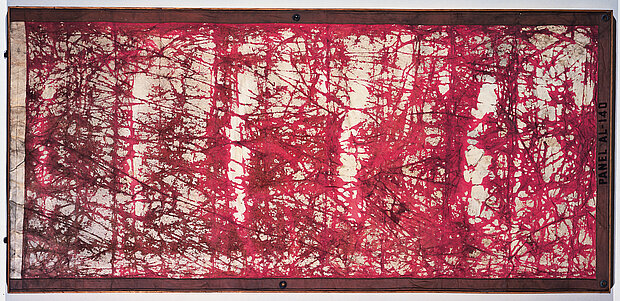
Deschamps, Gérard
Bâche de signalisation
1961

© mumok
| Object description | Found and damaged tarpaulin with peeling off color, enforced edges, metal eyes stretched over plywood |
|---|---|
| Object category | sculpture |
| Dimensions |
Objektmaß:
height: 79 cm,
width: 168 cm
Rahmenmaß:
height: 100,3 cm,
width: 190,4 cm,
depth: 13,5 cm
|
| Year of acquisition | 1979 |
| Inventory number | B 355/0 |
| Creditline | mumok - Museum moderner Kunst Stiftung Ludwig Wien, ehemals Sammlung Hahn, Köln |
| Rights reference | Bildrecht, Wien |
| Further information about the person | Deschamps, Gérard [GND] |
| Literature |
museum moderner kunst.SAMMLUNG HAHN Paris: Capital of the Arts. 1900-1968 Nouveau Réalisme. Schwerpunkte der Sammlung |
Artist Gerard Deschamps, born in Lyon, was self-taught, presenting his collages for the first time in 1957 in a Paris gallery. Everyday found items like sheets of plastic, clothing, and tarpaulins were his material basis. His way of working and choice of materials evidence his allegiance to nouveau réalisme, and his wish to transcend the borders between art and life—so the ideal goal. Classical painting was anathema, as it was seen as an obsolete medium of bourgeois representation. The work “Bache de Signalisation” is one of several in which Deschamps used old signal tarpaulin. It shows many signs of use, with the color peeling off in many places, which creates a painterly effect. By stretching and framing it, Deschamps gives the tarpaulin a new context which asks as to the conditions of our perception of art in the museum space. Asked in an interview if he was more a collector or an artist, Gerard Deschamps answered: “If you like. But it’s still work: you have to look at hundreds of tarpaulins before you discover one that is discolored like this one.”
© mumok – museum moderner kunst stiftung ludwig wien